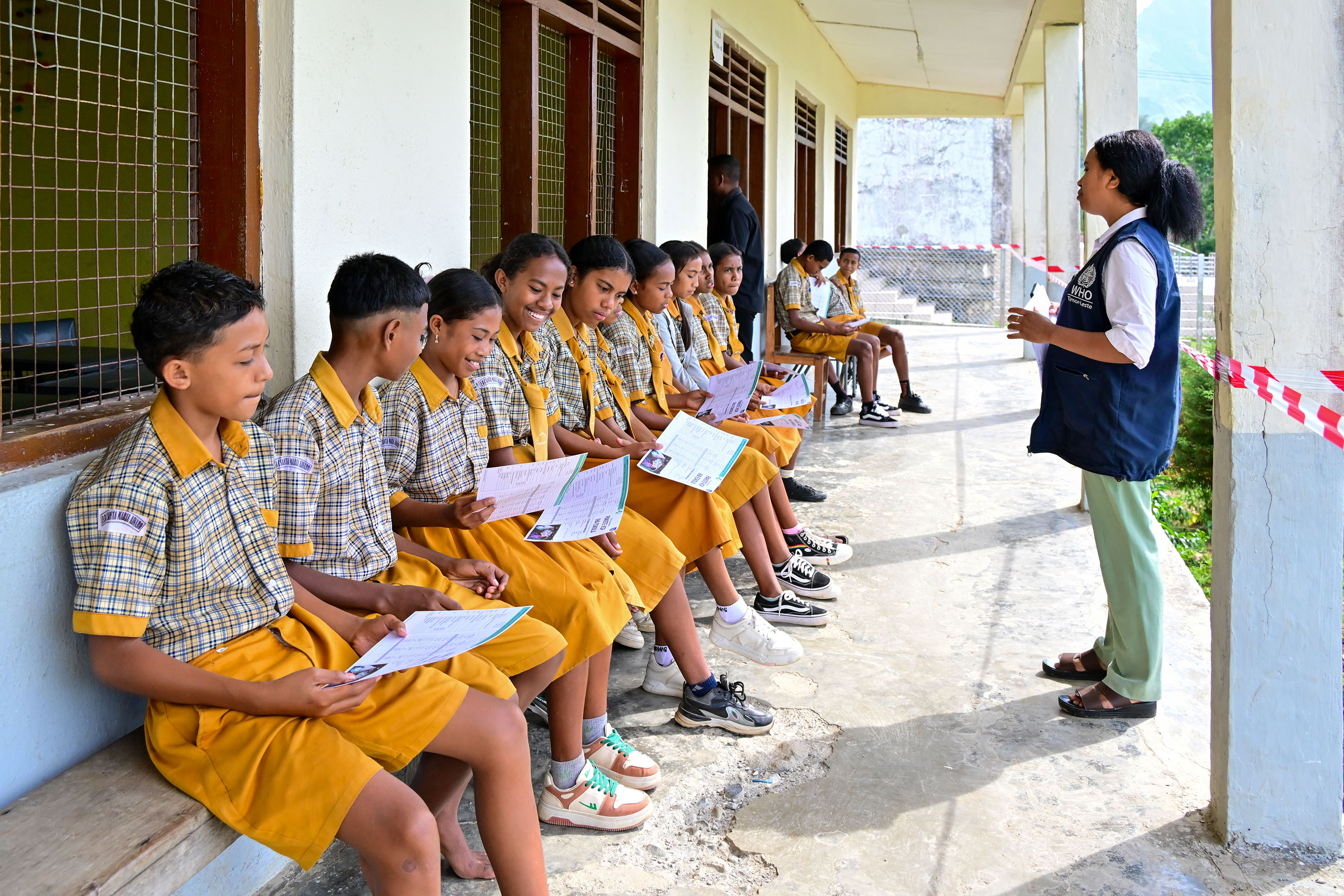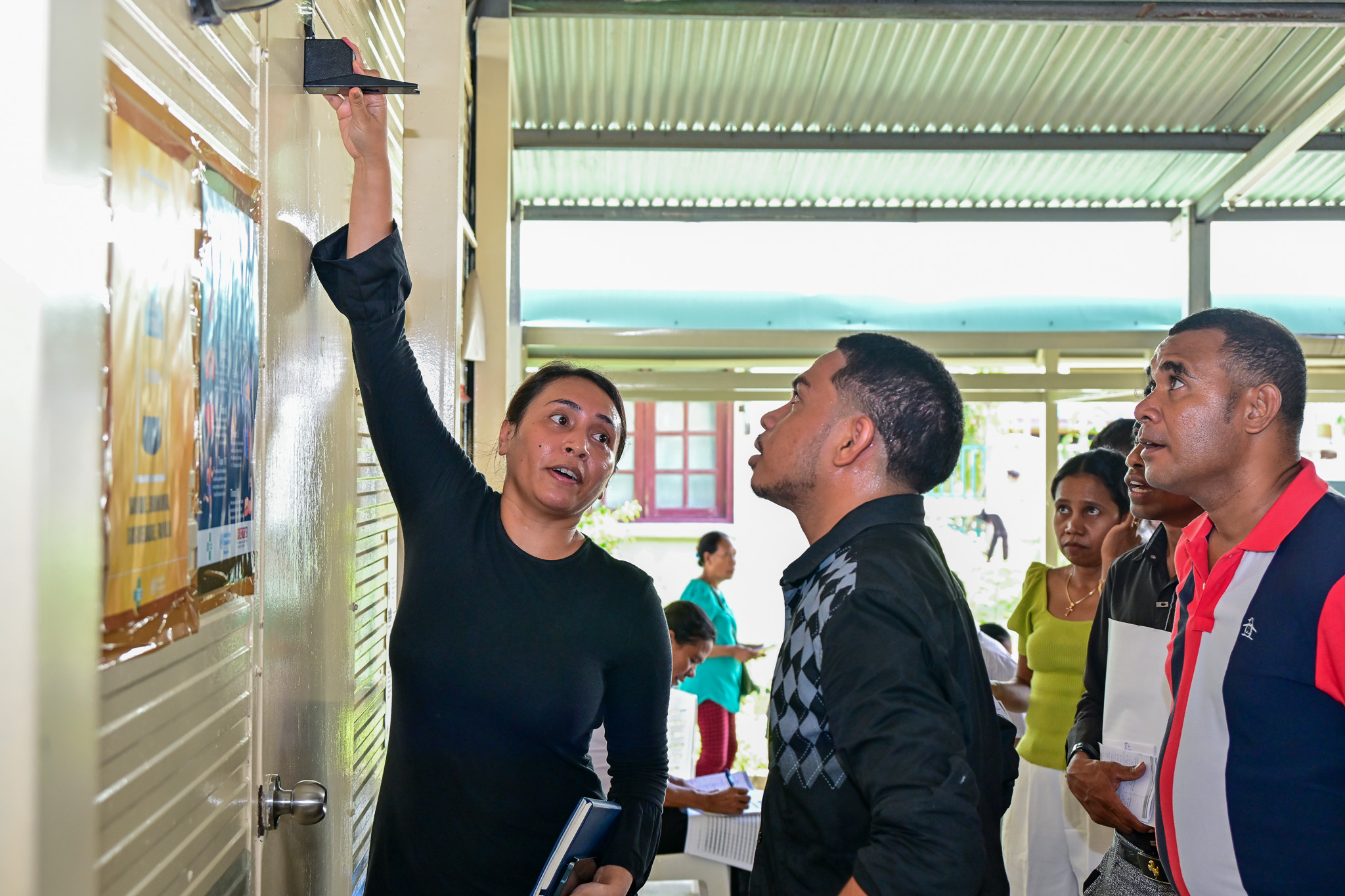Dili, December: In the brightly lit classroom of Ensino Basico Central (EBC) 3 in Santa Maria, Ainaro Vila, healthcare workers and teachers unrolled posters, carefully preparing their materials. Rows of children sat quietly, their faces a blend of curiosity and resolve. The scene, while ordinary at first glance, was anything but routine. It marked the launch of a transformative national screening initiative aimed at positioning schools as a vital bridge to healthcare for children across Timor-Leste.

As the screening began, healthcare workers moved methodically through the classroom, conducting a series of health checks. In one corner, a worker used an otoscope to examine a boy’s ear, while neatly arranged medical forms and tools sat on a desk nearby, reflecting the programme’s organization. In another section, a vision test was underway, with a healthcare worker guiding a student to follow a pen with his eyes, the chalkboard eye chart in the background. Nearby, a hearing test unfolded as a girl held her hand to her ear, responding to a worker noting observations in a notebook.
Together, these screenings marked the
beginning of the School-Based Primary Health Care Package (PHCP), a programme
designed to catch issues like growth delays, vision problems, hearing loss,
skin conditions, and oral health early, connect kids to health centres for
care, and set them up for healthier futures.

Since its rollout in November, the PHCP has reached 78 schools, screening over 8,000 students from grades 1 to 9 across six municipalities and laying the groundwork for continued implementation in 2025.
 The well-coordinated PHCP
launch was the culmination of two years of intensive planning, starting at the
top levels of the Ministries of Health and Education and flowing through
municipalities to individual schools. With support from the WHO, this effort
encompassed countless meetings, cross-sector coordination, and detailed
groundwork to ensure the initiative reached even the most remote classrooms.
The well-coordinated PHCP
launch was the culmination of two years of intensive planning, starting at the
top levels of the Ministries of Health and Education and flowing through
municipalities to individual schools. With support from the WHO, this effort
encompassed countless meetings, cross-sector coordination, and detailed
groundwork to ensure the initiative reached even the most remote classrooms.

Before the launch,
more than 840 healthcare workers and 2,000 teachers across municipalities were
trained from July to October 2024 to conduct health screenings and monitor
growth metrics like BMI.
 The program has not
been without its challenges. Infrastructure gaps and rugged terrain often made
reaching schools difficult. Healthcare workers in some cases navigated broken
roads or walked long kilometers to reach remote schools. Despite these
obstacles, the program has covered schools across six districts—Ainaro,
Bobonaro, Dili, Lautem, Manatuto, and Viqueque. The next phase aims to extend
health screenings to all Basic Education Schools nationwide.
The program has not
been without its challenges. Infrastructure gaps and rugged terrain often made
reaching schools difficult. Healthcare workers in some cases navigated broken
roads or walked long kilometers to reach remote schools. Despite these
obstacles, the program has covered schools across six districts—Ainaro,
Bobonaro, Dili, Lautem, Manatuto, and Viqueque. The next phase aims to extend
health screenings to all Basic Education Schools nationwide.
Human resource challenges added another layer of complexity. Both teachers and healthcare workers sometimes found it challenging to calculate metrics like Body Mass Index (BMI), which may seem straightforward but require careful interpretation for children. Unlike adults, BMI for kids is assessed differently, taking into account age and gender to determine ‘BMI-for-age’. These nuances necessitated additional support, such as software tools, to ensure the programme's objectives were effectively achieved.
 These efforts are
already uncovering intriguing findings. Dental issues, for instance, are
emerging as a common concern requiring attention, while nutrition has surfaced
as a particularly troubling area. The initiative, being the first of its kind,
is also uncovering societal and cultural challenges, such as instances where
parents are unaware of their children’s birthdates or full names, reflecting
deeper gaps in record-keeping and awareness.
These efforts are
already uncovering intriguing findings. Dental issues, for instance, are
emerging as a common concern requiring attention, while nutrition has surfaced
as a particularly troubling area. The initiative, being the first of its kind,
is also uncovering societal and cultural challenges, such as instances where
parents are unaware of their children’s birthdates or full names, reflecting
deeper gaps in record-keeping and awareness.
.jpg?sfvrsn=b43cb890_1)
The PHCP is part of the broader Say No to 5S (SN5S) project, which targets five critical health challenges in Timor-Leste: starvation, soil-transmitted helminthiasis, skin diseases, smoking, and sugary or alcoholic drinks. The SN5S project aims at reaching out to nearly 300,000 children over the next few years, with a focus on reducing and eliminating malnutrition and other diseases. Launched in March 2022, the SN5S project is backed by a $7.8 million grant from the Korea International Cooperation Agency (KOICA) and will continue through 2025.
"The launch of our transformative national screening initiative is a beacon of hope for children across Timor-Leste, positioning schools as vital bridges to essential healthcare. This initiative represents a collaborative effort between KOICA and WHO, emphasizing our shared mission to improve children's health. By providing children with their first opportunity to engage with formal healthcare, we can identify various health issues, such as growth delays, vision problems, and hearing loss, at an early stage and ensure they receive appropriate treatment. Together, we aim to bring us closer to a future where every child thrives in good health," said Ms Youn Hwa Kang, the Country Director of KOICA Timor-Leste Office.
